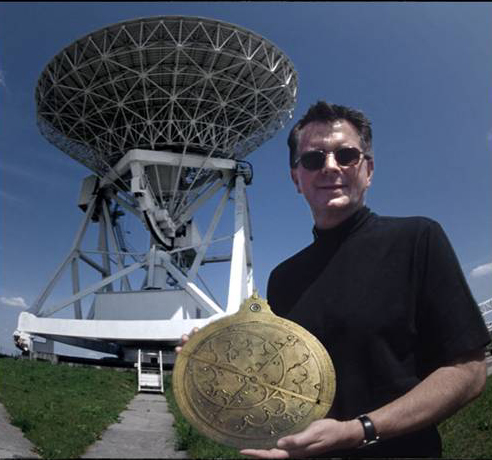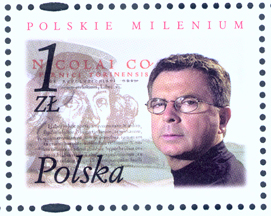Dr. Alex Wolszczan
Dr. Aleksander Wolszczan, Evan Pugh Professor of Astronomy and Astrophysics at Penn State and discoverer of the first planets found outside our solar system, was honored in 2002 by the country of Poland in having his likeness featured on a special set of 16 postage stamps celebrating the past millennium. Also featured on the stamp with Alex are Nicolaus Copernicus, considered by many to be the founder of modern astronomy, and the Arecibo radiotelescope, which Alex used in his discovery of the planets. After receiving his award, Alex said
I have been told that the design of the stamp is intended to celebrate a continuation of a good tradition in astronomy in my homeland. Copernicus moved us from the center of the universe to where we are now. Since then, many important steps have been taken to understand our position in the universe. My discovery is just one of many steps that have been taken.Nicolaus Copernicus University in Toruń. Copernicus, who lived from 1473 to 1543, developed the Copernican system, which placed the sun at the center of planetary orbits. Alex became the first person to discover planets outside our solar system in 1992, when he used the 1,000-foot Arecibo radiotelescope to detect planets orbiting a rapidly spinning neutron star. His discovery, which suggested that planets might be plentiful throughout the universe, opened the door to the current intense era of planet hunting.
The Polish 16-stamp set, titled “Polish Millennium”, summarizes the last 1,000 years of history, culture, and science in Poland. Each stamp represents a different field of life, including: Christianity; parliamentarism; history of political publications; theater; independence; internationalist traditions of the polish military forces; astronomy; education; traditions of the Polish army; the struggle for independence; art; music; Poland in the European system; Polish symbols; Polish sport; and, language, letters, and literature.
Alex was educated in Poland and then moved in 1982 to the USA to work at Cornell University in Ithaca and Princeton University. Later he became an astronomy professor at the Pennsylvania State University. Concurrent with that appointment, since 1994 he has been a professor at the Nicolaus Copernicus University in Toruń and a member of the Polish Academy of Sciences (PAN).
He carried out astronomical observations from the Arecibo Observatory which led him to the discovery of the pulsar PSR B1257+12 in 1990. The data analysis gathered thanks to the discovery showed that the pulsar is orbited by two planets with mass 3.4 and 2.8 times that of Earth’s mass. Their orbits are 0.36 and 0.47 AU respectively. This planetary system was the first extra-solar system discovered in the Universe whose existence was proved. He later discovered two more planets in this system.
Alex published his findings in 1992 and 1994. In spite of initial misgivings of some experts, today his discovery is regarded as fully substantiated.
He has won many awards, including Polish Astronomical Society Award for Young Astronomers (1976), Foundation for Polish Science Award (1992), Alfred Jurzykowski Foundation Prize (1993), The Best of What’s New – Grand Award of Popular Science Magazine (1994), the Beatrice M. Tinsley Prize by the American Astronomical Society (1996), the Casimir Funk Natural Sciences Award from the Polish Institute of Arts and Sciences in America (1996), the Commander Cross of the Order of Merit Award from the president of Poland (1998), received Evan Pugh Professor status (1998), Gold Medal Award of the American Institute of Polish Culture (2000), the Marian Smoluchowski Medal, the highest prize awarded by the Polish Physical Society (2001).
In 2005, he and Maciej Konacki discovered the smallest extra-solar planet to date. He authored Planetary systems around neutron stars a summary of research, March 1, 1993 through September 30, 1997 which was published by NASA. His many research articles can be searched here and here. His current areas of research are astronomy of extrasolar planetary systems, experimental gravitation, physics of the interstellar medium, searches for radio pulsars and pulsar timing, and signal processing techniques and instrumentation.
Alex received a Master’s degree in astronomy from Nicolaus Copernicus University in Toruń, Poland in 1969 and then earned a Ph.D. degree in physics there in 1975. His Ph.D. thesis concerned spectra of pulsars.

